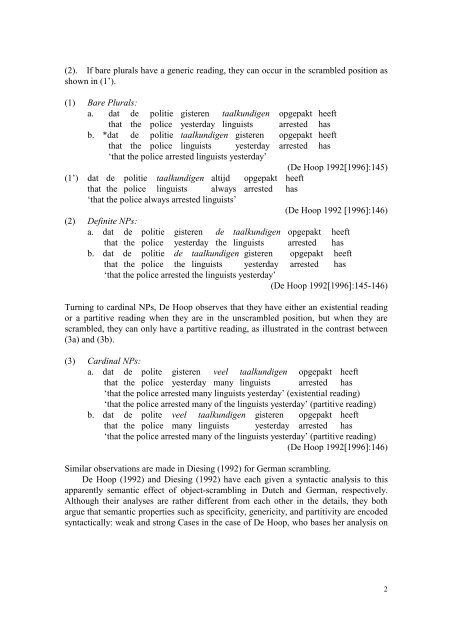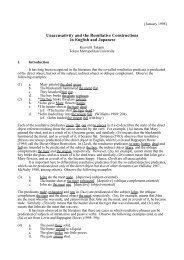Presuppositional Effects of Scrambling Reconsidered*
Presuppositional Effects of Scrambling Reconsidered*
Presuppositional Effects of Scrambling Reconsidered*
You also want an ePaper? Increase the reach of your titles
YUMPU automatically turns print PDFs into web optimized ePapers that Google loves.
(2). If bare plurals have a generic reading, they can occur in the scrambled position as<br />
shown in (1’).<br />
(1) Bare Plurals:<br />
a. dat de politie gisteren taalkundigen opgepakt heeft<br />
that the police yesterday linguists arrested has<br />
b. *dat de politie taalkundigen gisteren opgepakt heeft<br />
that the police linguists yesterday arrested has<br />
‘that the police arrested linguists yesterday’<br />
(De Hoop 1992[1996]:145)<br />
(1’) dat de politie taalkundigen altijd opgepakt heeft<br />
that the police linguists always arrested has<br />
‘that the police always arrested linguists’<br />
(De Hoop 1992 [1996]:146)<br />
(2) Definite NPs:<br />
a. dat de politie gisteren de taalkundigen opgepakt heeft<br />
that the police yesterday the linguists arrested has<br />
b. dat de politie de taalkundigen gisteren opgepakt heeft<br />
that the police the linguists yesterday arrested has<br />
‘that the police arrested the linguists yesterday’<br />
(De Hoop 1992[1996]:145-146)<br />
Turning to cardinal NPs, De Hoop observes that they have either an existential reading<br />
or a partitive reading when they are in the unscrambled position, but when they are<br />
scrambled, they can only have a partitive reading, as illustrated in the contrast between<br />
(3a) and (3b).<br />
(3) Cardinal NPs:<br />
a. dat de polite gisteren veel taalkundigen opgepakt heeft<br />
that the police yesterday many linguists arrested has<br />
‘that the police arrested many linguists yesterday’ (existential reading)<br />
‘that the police arrested many <strong>of</strong> the linguists yesterday’ (partitive reading)<br />
b. dat de polite veel taalkundigen gisteren opgepakt heeft<br />
that the police many linguists yesterday arrested has<br />
‘that the police arrested many <strong>of</strong> the linguists yesterday’ (partitive reading)<br />
(De Hoop 1992[1996]:146)<br />
Similar observations are made in Diesing (1992) for German scrambling.<br />
De Hoop (1992) and Diesing (1992) have each given a syntactic analysis to this<br />
apparently semantic effect <strong>of</strong> object-scrambling in Dutch and German, respectively.<br />
Although their analyses are rather different from each other in the details, they both<br />
argue that semantic properties such as specificity, genericity, and partitivity are encoded<br />
syntactically: weak and strong Cases in the case <strong>of</strong> De Hoop, who bases her analysis on<br />
2



